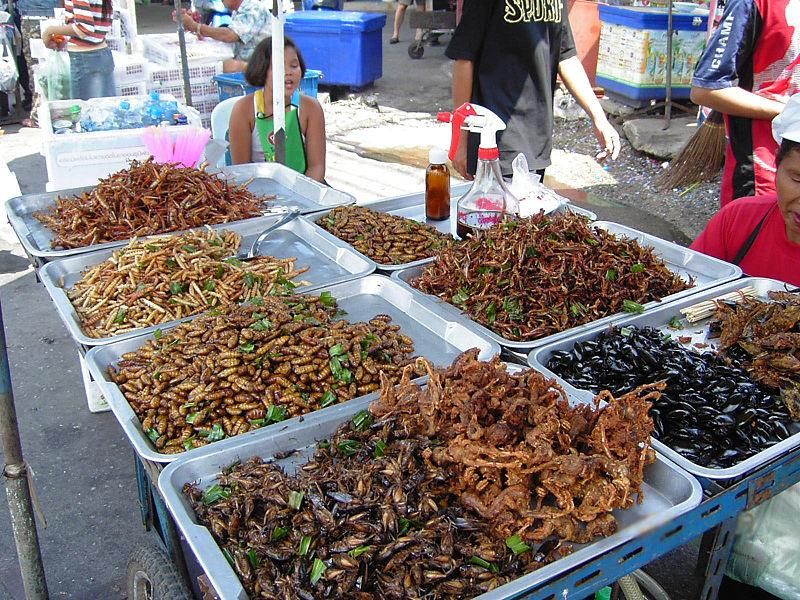Your Opinion of Sushi Is a Good Predictor of How Willing You Are to Eat Insects
Individuals who frequently dine on sushi are more likely to try insects than their raw fish-rejecting counterparts
/https://tf-cmsv2-smithsonianmag-media.s3.amazonaws.com/filer/ae/37/ae375148-31a4-4080-8d39-151a99e622ea/800px-sushi_and_maki_feast.jpg)
If the idea of feasting on wax worm tacos, roasted cicadas and grasshopper guacamole turns your stomach, you’re not alone. Despite the fact that insects are considered delicacies in many parts of the world, Europeans and North Americans remain notoriously adverse to bug-based cuisine.
Still, new research suggests some Americans are more likely to embrace entomophagy, or the practice of eating insects, than others: As researchers Matthew Ruby of Australia’s La Trobe University and Paul Rozin of the University of Pennsylvania report in the journal Food Quality and Preference, individuals who frequently dine on sushi are more willing to branch out and try insects than their raw fish-rejecting counterparts. Of the 82 percent of U.S.-based study participants who indicated they would be willing to eat insects, 43 percent said they ate sushi on a regular basis.
“Until relatively recently, the idea of trying sushi ... was often thought of with disgust in many societies,” Ruby says in a press release. “Just like eating sushi, eating insects will take some getting used to.”
According to Cosmos’ Andrew Masterson, Ruby and Rozin used Amazon’s crowdsourcing Mechanical Turk platform to recruit nearly 700 respondents residing in the United States and India. After winnowing this pool down to 476 participants, the researchers conducted surveys on topics ranging from general food preferences to history of insect consumption and religious beliefs.
Writing for Border Mail, Anthony Bunn notes that the scientists chose to focus on the U.S. and India because residents of the former enjoy a heavily meat-focused diet, while those living in the latter often prefer vegetables due to dietary restrictions associated with Hinduism. Perhaps unsurprisingly, then, the team discovered that American respondents were more likely than Indians to view bugs as a viable food source. On average, men in both countries were more accepting of insect-eating than women.
As Ruby and Rozin write in the study, individuals’ attitude toward insect cuisine revolve around five main themes: benefits conferred by the practice (such as environmental sustainability or nutritional value), disgust, perceived risks, violations of religious principles and suffering endured by the critters in question. Amongst U.S. participants, disgust emerged as a driving factor, while frequency of sushi intake and benefits followed closely. In India, benefits outweighed disgust, although religion and sushi preferences also influenced respondents’ willingness to eat bugs.

Some two billion of Earth’s inhabitants—centered largely in Latin America, West Africa and Southeast Asia, according to ScienceLine’s Polina Porotsky—eat insects on a regular basis. In Japan, for example, smoky liquor seasoned with hornet’s venom is paired with hornet larvae simmered in ginger, soy sauce and mirin. Moving to sub-Saharan Africa, Charlotte Payne writes for BBC News, sauteed termites are top sellers at the region’s urban markets, while shea caterpillar stew and palm weevil larvae are considered local delicacies in Burkina Faso and the Democratic Republic of Congo, respectively.
Despite insect cuisine’s prevalence across the globe, Westerners have been reluctant to embrace entomophagy. Much of this resistance stems from culturally-cultivated feelings of disgust, Ligaya Mishan explains for The New York Times Style Magazine. Most edible insects aren’t native to Europe, so locals and, by extension, European settlers arriving in North America, never incorporated bugs into their diet.
As Mishan observes, “[Instead] we largely consider insects dirty and drawn to decay, signifiers and carriers of disease; we call them pests, a word whose Latin root means plague.”
Unfortunately for bug-wary diners—but fortunately for the planet, which would benefit from a major reduction in the meat industry’s carbon footprint, edible insects appear to be gaining traction across the Western world. As the Harvard Political Review’s Kendrick Foster reports, insect cookbooks and more palatable dining options, including cricket flour that precludes the visceral reaction sparked by coming face-to-face with a beady-eyed bug, are helping entomophagy proponents normalize the practice.
“We’re trying to rebrand [the ick factor] to the wow factor, in a similar way to a roller coaster,” Aly Moore, founder of bug blog Bugible, tells Foster. “You’re terrified of it, and it’s scary, but after you do it, it’s super fun and really cool.”
Deep-fried tarantula, anyone?
/https://tf-cmsv2-smithsonianmag-media.s3.amazonaws.com/accounts/headshot/mellon.png)
/https://tf-cmsv2-smithsonianmag-media.s3.amazonaws.com/accounts/headshot/mellon.png)